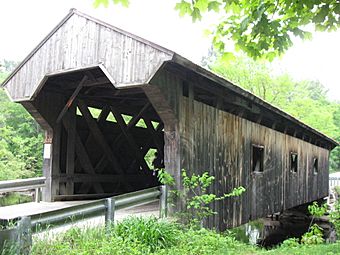Waterloo Covered Bridge facts for kids
|
Waterloo Covered Bridge
|
|
|
U.S. Historic district
Contributing property |
|
 |
|
| Location | Newmarket Rd., Waterloo, New Hampshire |
|---|---|
| Area | 0.1 acres (0.040 ha) |
| Built | 1859 |
| Architect | Woods, Dutton |
| Architectural style | Town lattice truss |
| Part of | Waterloo Historic District (ID03000926) |
| NRHP reference No. | 76000130 |
Quick facts for kids Significant dates |
|
| Added to NRHP | November 21, 1976 |
| Designated CP | September 13, 2003 |
The Waterloo Covered Bridge is a special old bridge that crosses the Warner River in Warner, New Hampshire. It's near a spot called Waterloo Falls. This bridge was built a long time ago, in 1859-1860. It replaced an even older bridge that was there before.
The Waterloo Covered Bridge is one of the few covered bridges from the 1800s that are still standing in New Hampshire. It uses a special design called a "Town lattice truss." This design uses many crisscrossing wooden beams to make the bridge strong. The bridge was added to the National Register of Historic Places in 1976. This means it's an important historical site worth protecting. In 2003, it also became part of the Waterloo Historic District.
About the Waterloo Covered Bridge
The Waterloo Covered Bridge is located in the western part of Warner. It stretches over the Warner River, running mostly from northeast to southwest. It's a single-span bridge, meaning it crosses the river in one continuous section.
What the Bridge Looks Like
The main part of the bridge is about 76 feet (23 meters) long. Its total length, including the parts that rest on the ground, is about 84 feet (25 meters). The bridge sits on strong concrete foundations that were put in place in 1970. This was done during a big repair project to make the bridge last longer.
The road inside the bridge is about 13 feet (4 meters) wide. This is just enough space for one car to drive through at a time. The height inside the bridge is about 12 feet (3.6 meters). The outside of the bridge is covered with vertical wooden planks. It has a pointed roof made of corrugated metal. The wooden planks don't quite reach the roof, leaving a small open gap along the top. This gap helps with air flow. There are also several square openings cut into the sides. These openings let in extra light, so it's not too dark inside.
A Look Back in Time
The road that the bridge carries, Newmarket Road, was first planned by the town of Warner in 1839. This suggests that a bridge was probably already at this spot back then, or one was built soon after. The bridge we see today was most likely built in 1860. The town paid $473.65 for its construction. This price was quite low, which probably means that the stone supports (called abutments) on either side of the river were repaired, not completely rebuilt.
The area around the bridge, near Waterloo Falls, used to be a busy industrial spot. Many businesses used the power of the river's flowing water to run their machines. This made the bridge a very important part of the village. Over time, all these businesses closed down. Today, you can only see the remains of their foundations.
 | Bessie Coleman |
 | Spann Watson |
 | Jill E. Brown |
 | Sherman W. White |



